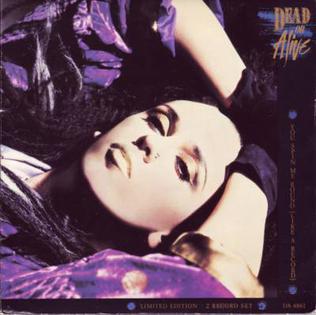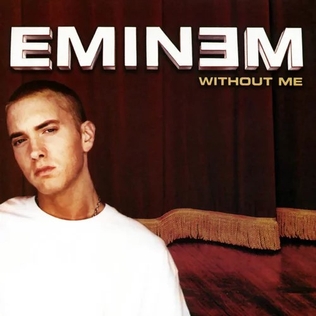Related Research Articles

"Don't Stand So Close to Me" is a hit song by the British rock band the Police, released in September 1980 as the lead single from their third studio album Zenyatta Mondatta. It concerns a teacher who has a sexual relationship with a student, which in turn is discovered.

"You Spin Me Round (Like a Record)" is a song by the English pop band Dead or Alive, featured on their second studio album, Youthquake (1985). Released as a single in November 1984, it reached No. 1 in the UK in March 1985, taking 17 weeks to get there. It was the first UK No. 1 hit by the Stock Aitken Waterman production trio.

"Never Can Say Goodbye" is a song written by Clifton Davis and originally recorded by the Jackson 5. The song was originally written and intended for the Supremes; however, Motown decided it would be better for the Jackson 5. It was the first single released from the group's 1971 album Maybe Tomorrow, and was one of the group's most successful records. It has been covered numerous times, most notably in 1974 by Gloria Gaynor and in 1987 by British pop group the Communards.

"Kung Fu Fighting" is a disco song by Jamaican vocalist Carl Douglas, written by Douglas and produced by British-Indian musician Biddu. It was released in 1974 as the first single from his debut album, Kung Fu Fighting and Other Great Love Songs (1974), on the cusp of a chopsocky film craze and rose to the top of the British, Australian, Canadian, and American charts, in addition to reaching the top of the Soul Singles chart. It received a Gold certification from the RIAA in 1974 and popularized disco music. It eventually went on to sell eleven million records worldwide, making it one of the best-selling singles of all time. The song uses the Oriental riff, a short musical phrase that is used to signify Chinese culture.

"December, 1963 " is a song originally performed by the Four Seasons, written by original Four Seasons keyboard player Bob Gaudio and his future wife Judy Parker, produced by Gaudio, and included on the group's album Who Loves You (1975).

"Da Ya Think I'm Sexy?", also written "Da' Ya' Think I'm Sexy", is a song by British singer Rod Stewart from his ninth studio album, Blondes Have More Fun (1978). It was written by Stewart, Carmine Appice, and Duane Hitchings, though it incorporates the melody from the song "Taj Mahal" by Jorge Ben Jor and the string arrangement from the song "(If You Want My Love) Put Something Down On It" by Bobby Womack.

"Bye, Bye, Baby " is a popular song written by Bob Crewe and Bob Gaudio. The Four Seasons' version of the song made it to No. 1 in Canada and No. 12 on the US Billboard Hot 100 in 1965. On the original issue of the single, the title was "Bye Bye Baby". However, on the album, The 4 Seasons Entertain You, and on later issues of the song, the name was changed to the longer, more familiar one. The song is about saying goodbye, not because the person is unloved but rather because the relationship is adulterous.

"Last Night a D.J. Saved My Life" is a song written by Michael Cleveland, sung by American group Indeep, and released as a single in 1982 by Sound of New York and Becket Records. It features vocals from Réjane "Reggie" Magloire and Rose Marie Ramsey. The track appears as the third track of the namesake album released in 1983.

"Could It Be Magic" is a song written by Adrienne Anderson and composed by American singer-songwriter Barry Manilow, inspired by Frédéric Chopin's Prelude in C minor, Opus 28, Number 20.

"Get Down Tonight" is a song released in 1975 on the self-titled album by the disco group KC and the Sunshine Band. The song became widely successful, becoming the first of their five No. 1 hits on the Billboard Hot 100. It also reached the top of the Hot Soul Singles chart and was an international chart hit, reaching No. 1 in Canada and charting in Australia, Belgium, the Netherlands, and the UK.

"That's the Way (I Like It)" is a song by American disco and funk band KC and the Sunshine Band from their self-titled second studio album (1975). The single became the band's second No. 1 hit in the Billboard Hot 100, and it is one of the few chart-toppers in history to hit No. 1 on more than one occasion during a one-month period, as it did between November and December 1975. It topped the American pop chart for one week, and then was replaced by another disco song, "Fly, Robin, Fly" by Silver Convention. "That's the Way (I Like It)" returned to No. 1 for one more week after "Fly, Robin, Fly" completed three weeks at the top. "That's the Way (I Like It)" also spent one week at No. 1 in the soul singles chart. The song is in natural minor.

"Diamonds" is a song by American trumpeter Herb Alpert from his 27th studio album, Keep Your Eye on Me (1987). Released as the second single from Keep Your Eye on Me on March 14, 1987, by A&M Records, the song features lead and background vocals by American singers Janet Jackson and Lisa Keith.

"D.I.S.C.O." is a song by the French band Ottawan, written by Daniel Vangarde and Jean Kluger and produced by Daniel Vangarde. Ottawan originally recorded it in French.
"Don't Leave Me This Way" is a song written by Kenneth Gamble, Leon Huff and Cary Gilbert. It was originally released in 1975 by Harold Melvin & the Blue Notes featuring Teddy Pendergrass, an act signed to Gamble & Huff's Philadelphia International label. "Don't Leave Me This Way" was subsequently covered by American singer Thelma Houston in 1976 and British duo the Communards in 1986, with both versions achieving commercial success.

"Please Forgive Me" is a song by Canadian rock musician Bryan Adams. It was released in October 1993 by A&M Records as the only single and bonus track from his first greatest hits compilation album, So Far So Good (1993). The single reached numbers seven and three on the US Billboard Hot 100 and Cash Box Top 100, and number two on the Billboard Adult Contemporary chart. In the United Kingdom, "Please Forgive Me" peaked at number two on the UK Singles Chart. It is his only Australian number-one single not written for a motion picture, and it also topped the charts of Belgium, Canada, France, Ireland, Norway, and Portugal. The accompanying music video was directed by Andrew Catlin and filmed in a recording studio, featuring a dog.

"Fly, Robin, Fly" is a song by the German disco group Silver Convention from their debut studio album Save Me (1975). Sylvester Levay and Stephan Prager wrote the song, and the latter produced it. "Fly, Robin, Fly" was released as the third single from Save Me in September 1975, reaching number one on the United States Billboard Hot 100. Thanks to the success of "Fly, Robin, Fly", Silver Convention became the second German act to have a number one song on the American music charts. The song received a Grammy Award for Best R&B Instrumental Performance in 1976.

Panic! at the Disco was an American rock band that originated in Las Vegas, Nevada. Their 2005 debut album, A Fever You Can't Sweat Out, reached number 13 on the US Billboard 200, and has sold more than 2.2 million copies in the US (pure) and been certified 4× platinum by the RIAA since its September 2005 release, spearheaded by the eight platinum top-10 hit single, "I Write Sins Not Tragedies". The band's second album, Pretty. Odd., was released on March 21, 2008, entering the US chart at, and peaking at, number 2 and is certified platinum by RIAA. Their third effort, Vices & Virtues, was released on March 18, 2011, and peaked at number 7 in the US and is certified gold by RIAA, spawned iconic comeback smash hit "The Ballad of Mona Lisa". Their fourth album, 2013's Too Weird to Live, Too Rare to Die!, entered and peaked at number 2 on the US chart, and contained hits such as "Miss Jackson", "This Is Gospel", and "Girls / Girls Boys". The band's fifth studio album, Death of a Bachelor, was released in January 2016 and became their first number-one album in the US. It has been certified 2× platinum in 2019. It is currently the most streamed album. Their sixth album, Pray for the Wicked, was released on June 22, 2018, and debuted at number one on the US Billboard 200. It has been certified 2× platinum by RIAA. It later became band's most successful era in terms of achievement and tour gross. Their seventh and final album, Viva Las Vengeance, released in August 2022, became the band's most critically acclaimed album to date.

"Get Up and Boogie" is a song by German disco act Silver Convention from their 1976 second album of the same name. The song was written and composed by Sylvester Levay and Stephan Prager, and produced by Prager. The song was released as the lead single from the album Get Up and Boogie in 1976.

"Without Me" is a song by American rapper Eminem from his fourth studio album The Eminem Show (2002). "Without Me" was released on May 13, 2002, as the lead single from the album, and re-released on his greatest hits compilation album Curtain Call: The Hits (2005). "Without Me" is one of Eminem's most successful singles, reaching number two on the U.S. Billboard Hot 100, and number one in fifteen countries.

The singles discography of English singer Cliff Richard consists in excess of 200 singles, of which 159 singles have been released in the UK in varying vinyl, CD, cassette and digital formats. Listed alongside the UK singles in the discography below are a further 20 singles which were released in other territories, as well as 22 singles which were sung in German and only released in German-speaking countries.
References
- ↑ "Record World" (PDF). Americanradiohsitory.com. 19 July 1975. p. 291. Retrieved 27 March 2022.
- ↑ Kent, David (1993). Australian Chart Book 1970–1992 (illustrated ed.). St Ives, N.S.W.: Australian Chart Book. p. 272. ISBN 0-646-11917-6.
- ↑ "Silver Convention – Save Me" (in Dutch). Ultratop 50.
- ↑ "Silver Convention – Save Me" (in French). Ultratop 50.
- ↑ "Offiziellecharts.de – Silver Convention – Save Me" (in German). GfK Entertainment charts.
- ↑ "Nederlandse Top 40 – week 23, 1975" (in Dutch). Dutch Top 40.
- ↑ "Silver Convention – Save Me" (in Dutch). Single Top 100.
- ↑ "Silver Convention – Save Me". VG-lista.
- ↑ "Official Singles Chart Top 100". Official Charts Company.
- ↑ "Silver Convention Songs ••• Top Songs / Chart Singles Discography ••• Music VF, US & UK hits charts". www.musicvf.com. Retrieved 2022-02-14.